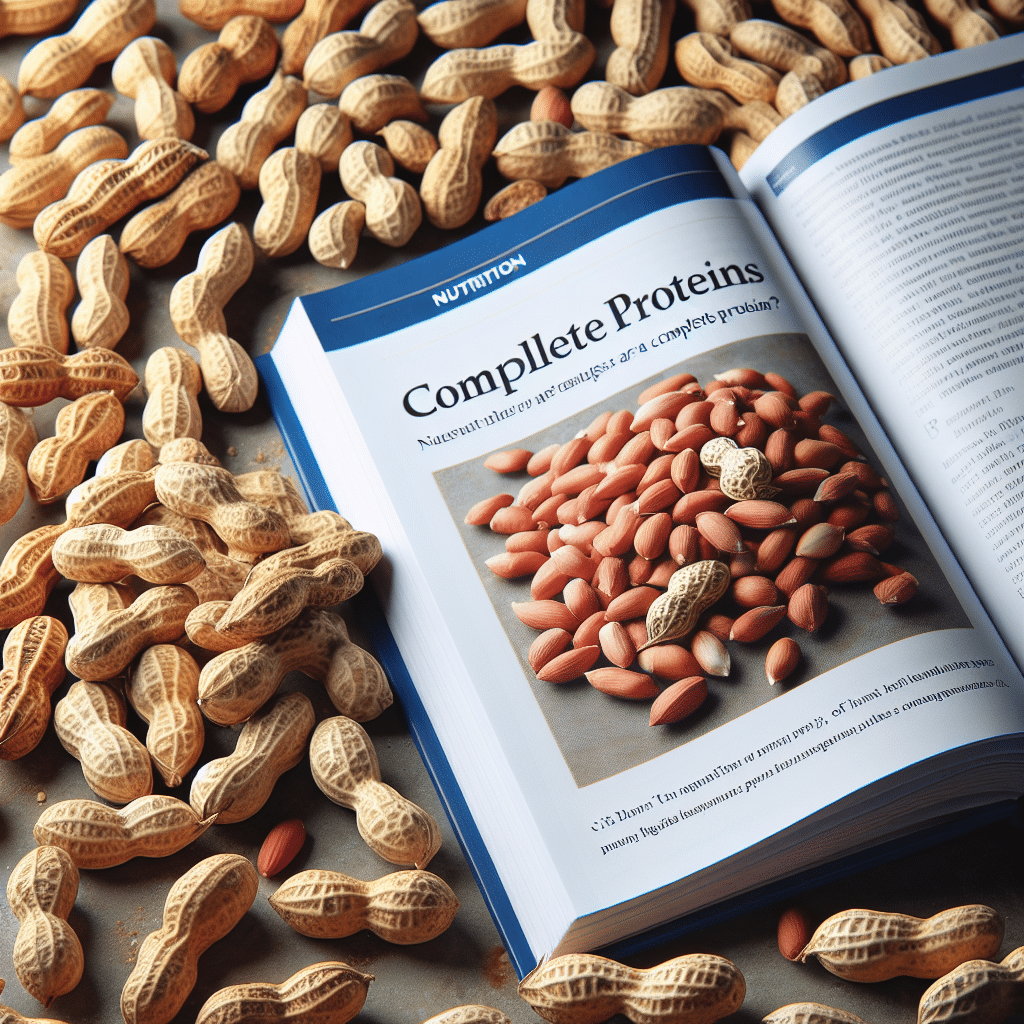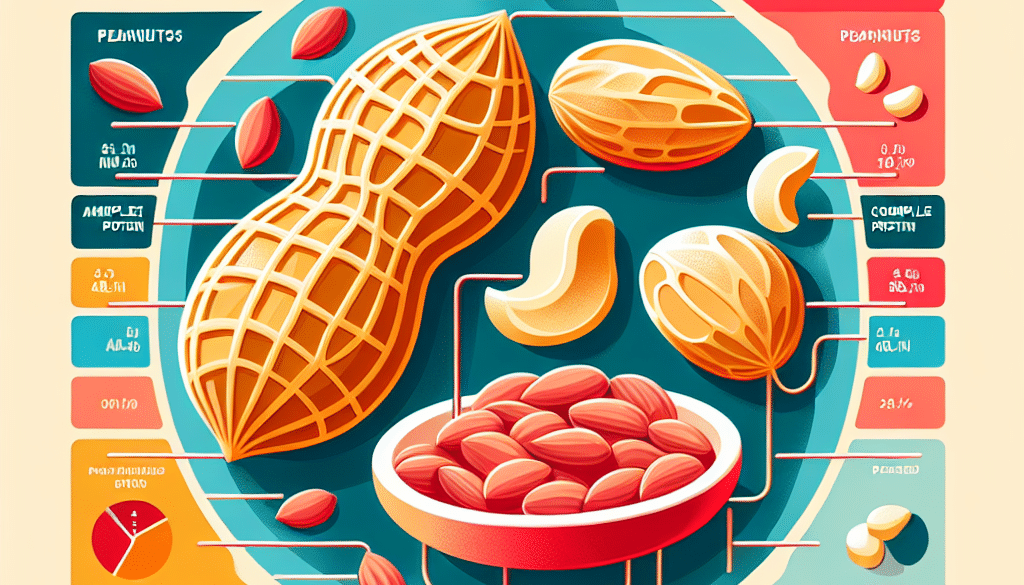Arepeanuts A Complete Protein?
-
Table of Contents
- Are Peanuts a Complete Protein? Unveiling the Nutritional Profile
- Understanding Complete Proteins
- The Nutritional Value of Peanuts
- Are Peanuts a Complete Protein?
- Complementary Proteins and Diet Diversity
- Health Benefits of Peanuts
- Peanuts in Global Diets
- Case Studies and Research
- Conclusion: The Role of Peanuts in a Protein-Rich Diet
- Discover ETprotein’s High-Quality Protein Products
Are Peanuts a Complete Protein? Unveiling the Nutritional Profile

Proteins are fundamental components of all living organisms and are crucial for the body’s structure, function, and regulation of tissues and organs. Amino acids, the building blocks of proteins, are vital for health, and a complete protein source contains all nine essential amino acids that the human body cannot synthesize on its own. In the quest for complete protein sources, especially within plant-based diets, peanuts have often been a topic of discussion. This article delves into whether peanuts are a complete protein and their role in a balanced diet.
Understanding Complete Proteins
Before we can assess peanuts as a protein source, it’s important to understand what makes a protein “complete.” Proteins are made up of amino acids, of which there are twenty different kinds. Nine of these are essential amino acids, meaning they must be obtained through diet as the body cannot produce them. A complete protein is one that provides all nine essential amino acids in sufficient quantities.
The Nutritional Value of Peanuts
Peanuts are a popular legume known for their rich flavor and high nutrient content. They are an excellent source of healthy fats, vitamins, minerals, and protein. When it comes to protein, peanuts contain about 25-30 grams per 100-gram serving, making them one of the richest plant-based protein sources available.
Are Peanuts a Complete Protein?
While peanuts are high in protein, they are not considered a complete protein. Peanuts lack sufficient amounts of some essential amino acids, such as methionine and cysteine. However, this does not diminish their value as a protein source. When combined with other foods that provide these missing amino acids, such as whole grains, peanuts can contribute to a complete protein profile in the diet.
Complementary Proteins and Diet Diversity
The concept of complementary proteins is crucial for those relying on plant-based proteins. By eating a variety of protein sources throughout the day, one can obtain all the essential amino acids needed for good health. For example, pairing peanuts or peanut butter with whole wheat bread can create a meal that collectively offers a complete protein.
- Whole grains (rich in methionine)
- Legumes, including peanuts (rich in lysine)
- Seeds and nuts
- Beans
By incorporating a mix of these foods into daily meals, even those on a vegetarian or vegan diet can ensure they receive a balanced amino acid intake.
Health Benefits of Peanuts
Aside from their protein content, peanuts offer a range of health benefits:
- Heart Health: Peanuts contain monounsaturated and polyunsaturated fats, which are beneficial for heart health.
- Antioxidants: They are rich in antioxidants, such as resveratrol, which can help fight oxidative stress in the body.
- Weight Management: Peanuts have a high satiety value, helping to keep you full and potentially aiding in weight management.
- Minerals: They are a good source of magnesium, phosphorus, and potassium, which are essential for bone health and metabolic processes.
Peanuts in Global Diets
Peanuts are a staple in many cultures and cuisines around the world. They are versatile and can be found in various forms, such as raw, roasted, as peanut butter, or in oil form. This versatility makes it easier to incorporate peanuts into meals to enhance protein intake and overall nutritional value.
Case Studies and Research
Several studies have highlighted the importance of including peanuts and other nuts in the diet. For instance, research published in the “Journal of Nutrition and Metabolism” has shown that including nuts in the diet can contribute to a reduced risk of chronic diseases, including heart disease and type 2 diabetes. Another study in the “American Journal of Clinical Nutrition” found that regular nut consumption is associated with a lower risk of weight gain and obesity.
Conclusion: The Role of Peanuts in a Protein-Rich Diet
In conclusion, while peanuts are not a complete protein on their own, they are a valuable part of a protein-rich diet when combined with other complementary foods. Their high protein content, along with numerous health benefits, makes them an excellent dietary choice for those looking to improve their protein intake, particularly in plant-based diets. By understanding the concept of complementary proteins and diversifying food choices, individuals can enjoy the nutritional benefits of peanuts and ensure a well-rounded intake of essential amino acids.
Discover ETprotein’s High-Quality Protein Products
If you’re looking to enhance your diet with high-quality protein sources, consider exploring ETprotein’s range of organic bulk vegan proteins. ETprotein is a reputable manufacturer and supplier known for their premium protein products, including peanut protein. Their offerings are characterized by a neutral taste, non-GMO, allergen-free attributes, and high purity levels, catering to various industries and dietary needs.
Whether you’re involved in sports nutrition, weight management, dietary supplements, or simply seeking to enrich your personal diet, ETprotein provides comprehensive solutions to meet all your protein requirements. As a trusted company by leading global brands, ETprotein ensures that you receive only the best in protein supplementation.
About ETprotein:
ETprotein, a reputable protein and L-(+)-Ergothioneine (EGT) Chinese factory manufacturer and supplier, is renowned for producing, stocking, exporting, and delivering the highest quality organic bulk vegan proteins and L-(+)-Ergothioneine. They include Organic rice protein, clear rice protein, pea protein, clear pea protein, watermelon seed protein, pumpkin seed protein, sunflower seed protein, mung bean protein, peanut protein, and L-(+)-Ergothioneine EGT Pharmaceutical grade, L-(+)-Ergothioneine EGT food grade, L-(+)-Ergothioneine EGT cosmetic grade, L-(+)-Ergothioneine EGT reference grade and L-(+)-Ergothioneine EGT standard. Their offerings, characterized by a neutral taste, non-GMO, allergen-free attributes, with L-(+)-Ergothioneine purity over 98%, 99%, cater to a diverse range of industries. They serve nutraceutical, pharmaceutical, cosmeceutical, veterinary, as well as food and beverage finished product distributors, traders, and manufacturers across Europe, USA, Canada, Australia, Thailand, Japan, Korea, Brazil, and Chile, among others.
ETprotein specialization includes exporting and delivering tailor-made protein powder and finished nutritional supplements. Their extensive product range covers sectors like Food and Beverage, Sports Nutrition, Weight Management, Dietary Supplements, Health and Wellness Products, and Infant Formula, ensuring comprehensive solutions to meet all your protein needs.
As a trusted company by leading global food and beverage brands and Fortune 500 companies, ETprotein reinforces China’s reputation in the global arena. For more information or to sample their products, please contact them and email sales(at)ETprotein.com today.














